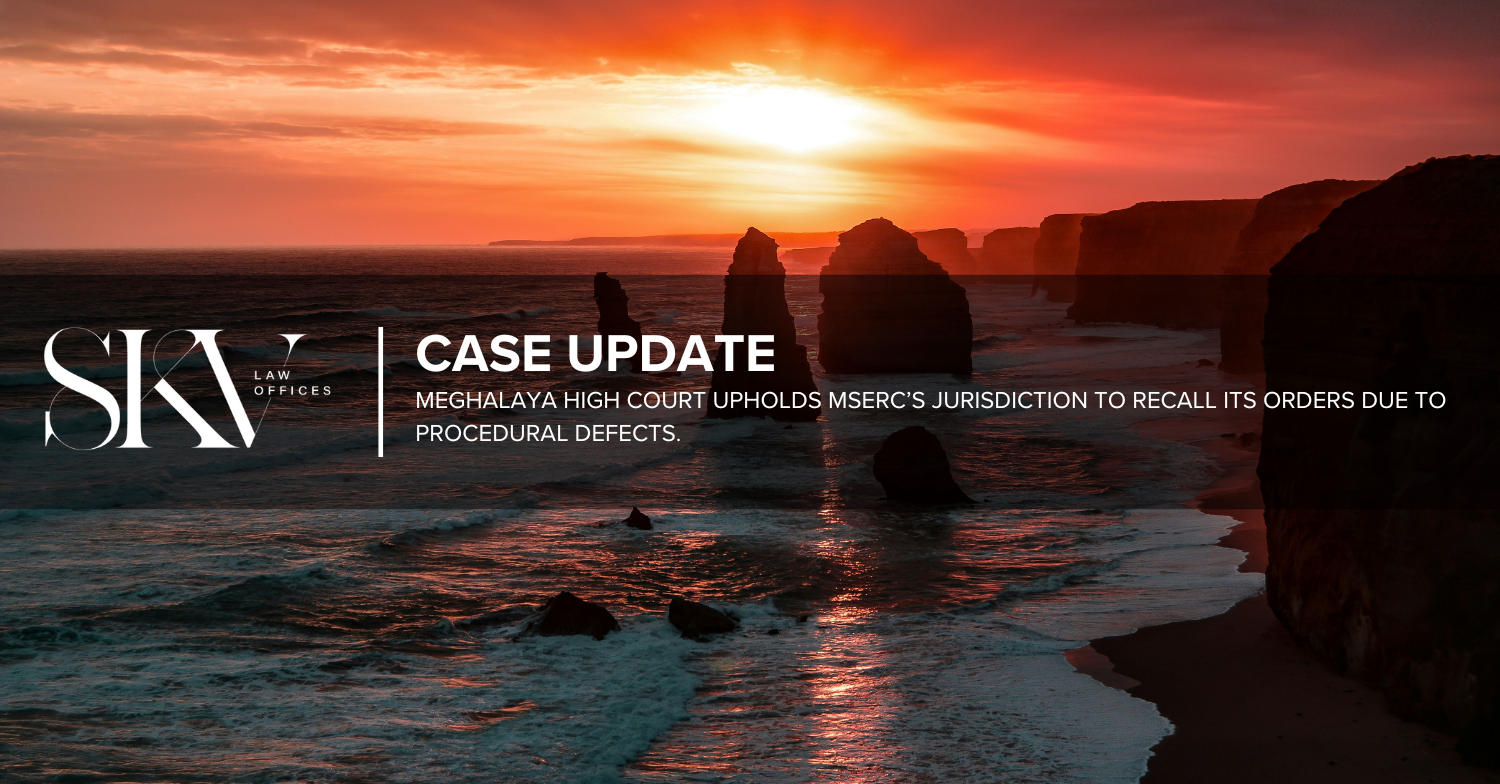Meghalaya High Court upholds MSERC’s Jurisdiction to Recall it’s Orders due to Procedural Defects
04.05.2025
The High Court of Meghalaya dismissed three writ petitions filed by the Byrnihat Industries Association (“BIA”), Pioneer Carbide Pvt. Ltd, Maithan Alloys Ltd. and Shyam Century Ferrous Ltd. (hereinafter collectively referred to as “Petitioners”), challenging an order passed by the Meghalaya State Electricity Regulatory Commission (“MSERC”) on 23rd August 2024 (“Impugned Order”). The MSERC, vide the impugned order, had recalled its earlier tariff orders dated 5th and 6th June 2024 (“Tariff Orders”).
The Tariff Orders, issued under Sections 62 and 64 of the Electricity Act for determination of tariff and true-up for FY 2024-25 and FY 2026-27. At the time of signing these orders, the Chairperson of MSERC had already demitted office. Consequently, the Tariff Orders were signed solely by the Member (Law), who was part of the quorum hearing the matter. This gave rise to a procedural challenge by the Meghalaya Utilities, who filed writ petitions before the High Court of Meghalaya, asserting that the orders were vitiated due to lack of quorum and non-compliance with Regulation 18(3) of the MSERC Conduct of Business Regulations, 2007 (“2007 Regulations”).
On 25th June 2024, the High Court stayed the Tariff orders, and citing a prima facie case of procedural irregularity. Subsequently, on 23rd July 2024, the Meghalaya utilities withdrew their writ petitions after the MSERC issued a statement saying that it would reconsider the matter afresh. Following this statement, the utilities filed applications before the MSERC for rehearing and recall of the earlier tariff orders. Accordingly, the MSERC issued notices which were subsequently challenged once again before the High Court, with the assertion that the MSERC had become functus officio, and hence did not have the competent jurisdiction to recall or rehear its orders. This writ petition was disposed of on 8th August 2024, with liberty for the petitioners to raise their objections before the MSERC.
Following these directions, the BIA filed its objections before MSERC. After hearing the parties, the MSERC passed the Impugned Order to recall the Tariff Orders and fixed the matter for rehearing. The petitioners then filed fresh Writ Petitions before the High Court of Meghalaya, seeking quashing of the impugned order, on the ground that the MSERC had acted without jurisdiction.
The Petitioners argued that once the tariff orders were passed, the Commission became functus officio and could not revisit them. They claimed that the recall was not based on clerical or error apparent but was a substantive review, which was outside the scope of inherent powers under Regulation 26 of the 2007 Regulations. Petitioners also contended that the mere existence of an appellate remedy under Section 111 of the Electricity Act did not preclude the invocation of the Court’s writ jurisdiction, specially in cases where the impugned action was alleged to be wholly without jurisdiction.
The MSERC answered these contentions stating that the original tariff orders were non est in law due to being signed only by one member when the matter had been heard by two. Placing reliance on several precedents, including judgements by the Appellate Tribunal for Electricity and the Supreme Court, the MSERC maintained that the orders not signed in accordance with quorum and procedural requirements are void ab initio. It further contended that it was vested with inherent powers under Regulation 111 of the MSERC Multi Year Tariff Regulations, 2014 and Regulation 26 of the 2007 Regulations to recall orders in the interest of justice. The MSERC also pointed out that its decision to revisit the matter was not taken suo motu but was in response to applications filed by the Meghalaya utilities, as permitted by the High Court in its earlier order dated 23rd July 2024.
After due consideration of the matter, the High Court held that the MSERC had not acted outside its jurisdiction and further held that the said Order is Appealable under Section 111 of the Electricity Act. The Court found that the Tariff Orders were invalid for non-compliance with Regulation 18(3), as they were not signed by the quorum that heard the matter. The High Court relied on the Supreme Court’s decision in Greater Noida Industrial Development Authority v. Prabhijit Singh Soni while holding that the tribunals and quasi-judicial bodies are empowered to exercise inherent powers in appropriate cases to recall orders that suffer from jurisdictional or procedural defects. Hence, the High Court upheld the Commission’s action as a valid exercise of its inherent powers and declined to interfere under Article 226 of the Constitution.
Click here to read the full judgement of the Meghalaya High Court.
The Meghalaya State Electricity Regulatory Commission was represented before the Meghalaya High Court by Shri Venkatesh (Founding Partner), Siddharth Nigotia (Senior Associate), Abhishek Nangia (Senior Associate) and Adarsh Singh (Associate) of the SKV Law Offices Team.


